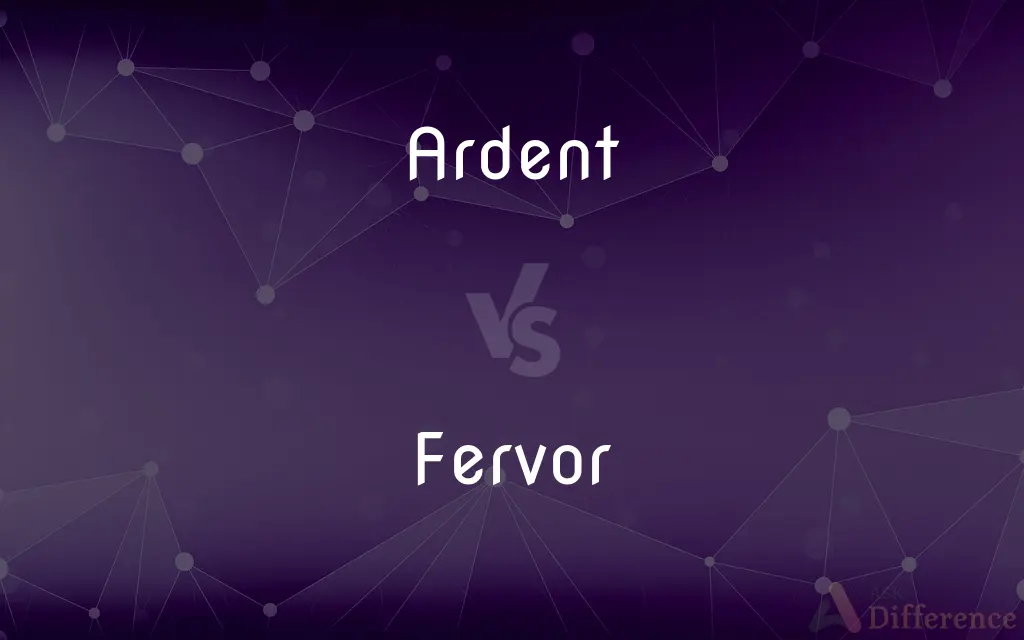Ardent vs. Fervor — What's the Difference?
By Maham Liaqat & Urooj Arif — Updated on March 15, 2024
"Ardent" describes a passionate, intense feeling or enthusiasm someone has, while "fervor" refers to the intense and passionate feeling itself.

Difference Between Ardent and Fervor
Table of Contents
ADVERTISEMENT
Key Differences
Ardent is an adjective used to describe a person's intense, passionate feelings, or their enthusiastic or zealous nature towards something, such as in "an ardent supporter." Fervor, a noun, represents the intensity of passionate feeling or belief, like in "the fervor of his convictions."
An ardent individual displays deep enthusiasm and passion, which can be directed towards a wide range of interests, people, or causes, indicating a personal attribute or quality. Fervor, on the other hand, is the quality or state of being ardent, often used to describe the intensity of an emotion or expression within a particular context or moment.
While "ardent" can be used to describe a person or their characteristics (e.g., "an ardent fan"), "fervor" is used to describe the intensity of the feelings or expressions themselves (e.g., "she sang with fervor"). This distinction highlights "ardent" as a descriptor of someone's passionate nature, whereas "fervor" refers to the passionate intensity of the emotion or action itself.
The use of "ardent" often implies a sustained or enduring quality, suggesting that the person has a consistent and deep-seated passion. In contrast, "fervor" can suggest a more immediate, intense, and possibly fluctuating level of passion or enthusiasm, which can vary in duration and intensity according to the situation.
Although "ardent" and "fervor" are related in terms of intense passion, their grammatical roles and contextual implications differ, making it important to choose the appropriate term based on whether describing a person's characteristic (ardent) or the quality of the emotion (fervor).
ADVERTISEMENT
Comparison Chart
Part of Speech
Adjective
Noun
Describes
A person's passionate intensity
The intensity of passion itself
Usage
To describe someone or their characteristics
To describe the intensity or level of emotion
Implication
Suggests a sustained or enduring quality
Can indicate a more immediate, intense feeling
Examples
"An ardent admirer"
"The fervor of a political rally"
Compare with Definitions
Ardent
Characterized by strong enthusiasm or devotion.
She is an ardent advocate for environmental conservation.
Fervor
Intense and passionate feeling.
He spoke with fervor about his vision for the future.
Ardent
Showing intense feeling; passionate.
His ardent love for music led him to become a composer.
Fervor
Great warmth and earnestness of feeling.
The charity event was organized with much fervor and enthusiasm.
Ardent
Eager, enthusiastic.
He was ardent about learning new languages.
Fervor
Intensity of emotion or expression.
The fervor in the crowd at the concert was palpable.
Ardent
Burning, glowing.
The ardent coals glowed in the dark room.
Fervor
Zealous or fervent spirit.
She pursued her studies with a fervor that impressed her professors.
Ardent
Marked by a strong commitment or dedication.
Her ardent support for the cause was inspiring.
Fervor
The state of being emotionally aroused and worked up.
The debate stirred up a fervor among the students.
Ardent
Expressing or characterized by warmth of feeling; passionate
An ardent lover.
Fervor
Great warmth and intensity of emotion.
Ardent
Displaying or characterized by strong enthusiasm or devotion; fervent
"an impassioned age, so ardent and serious in its pursuit of art" (Walter Pater).
Fervor
Intense heat.
Ardent
Burning; fiery.
Fervor
(American spelling) An intense, heated emotion; passion, ardor.
The coach trains his water polo team with fervor.
Ardent
Glowing; shining
Ardent eyes.
Fervor
(American spelling) A passionate enthusiasm for some cause.
Ardent
Full of ardor; expressing passion, spirit, or enthusiasm.
Fervor
(American spelling) Heat.
Ardent
(literary) Providing light or heat.
Fervor
Heat; excessive warmth.
The fevor of ensuing day.
Ardent
Hot or burning; causing a sensation of burning; fiery; as, ardent spirits, that is, distilled liquors; an ardent fever.
Fervor
Intensity of feeling or expression; glowing ardor; passion; holy zeal; earnestness.
Winged with fervor of her love.
Ardent
Having the appearance or quality of fire; fierce; glowing; shining; as, ardent eyes.
Fervor
Feelings of great warmth and intensity;
He spoke with great ardor
Ardent
Warm, applied to the passions and affections; passionate; fervent; zealous; vehement; as, ardent love, feelings, zeal, hope, temper.
An ardent and impetuous race.
Fervor
The state of being emotionally aroused and worked up;
His face was flushed with excitement and his hands trembled
He tried to calm those who were in a state of extreme inflammation
Ardent
Characterized by intense emotion;
Ardent love
An ardent lover
A burning enthusiasm
A fervent desire to change society
A fervent admirer
Fiery oratory
An impassioned appeal
A torrid love affair
Ardent
Characterized by strong enthusiasm;
Ardent revolutionaries
Warm support
Ardent
Glowing or shining like fire;
From rank to rank she darts her ardent eyes
Frightened by his ardent burning eyes
Common Curiosities
What does "ardent" specifically describe?
A person's intense passion or enthusiasm.
Can "ardent" describe a temporary feeling?
It typically implies a more sustained passion.
How is "fervor" used differently from "ardent"?
As a noun, it describes the intensity of passion itself.
Does "fervor" suggest a level of energy?
Yes, it implies a high level of emotional intensity or energy.
How do "ardent" and "fervor" complement each other?
"Ardent" can describe the nature of a person or their actions, while "fervor" describes the intensity of the feeling they exhibit.
Can the use of "ardent" and "fervor" overlap?
In context, they can relate but are used differently grammatically and in terms of emphasis.
Is "fervor" always positive?
It generally has a positive connotation but depends on context.
Can "ardent" and "fervor" be related?
Yes, an ardent person might exhibit fervor in their actions or beliefs.
Is "fervor" associated with a specific type of emotion?
It's broadly related to passionate intensity, regardless of the specific emotion.
Can "ardent" be used to describe things other than people?
Less commonly, but it can describe actions or expressions reflecting intense passion.
Share Your Discovery

Previous Comparison
Minimisation vs. Minimalisation
Next Comparison
Woggle vs. ToggleAuthor Spotlight
Written by
Maham LiaqatCo-written by
Urooj ArifUrooj is a skilled content writer at Ask Difference, known for her exceptional ability to simplify complex topics into engaging and informative content. With a passion for research and a flair for clear, concise writing, she consistently delivers articles that resonate with our diverse audience.
















































